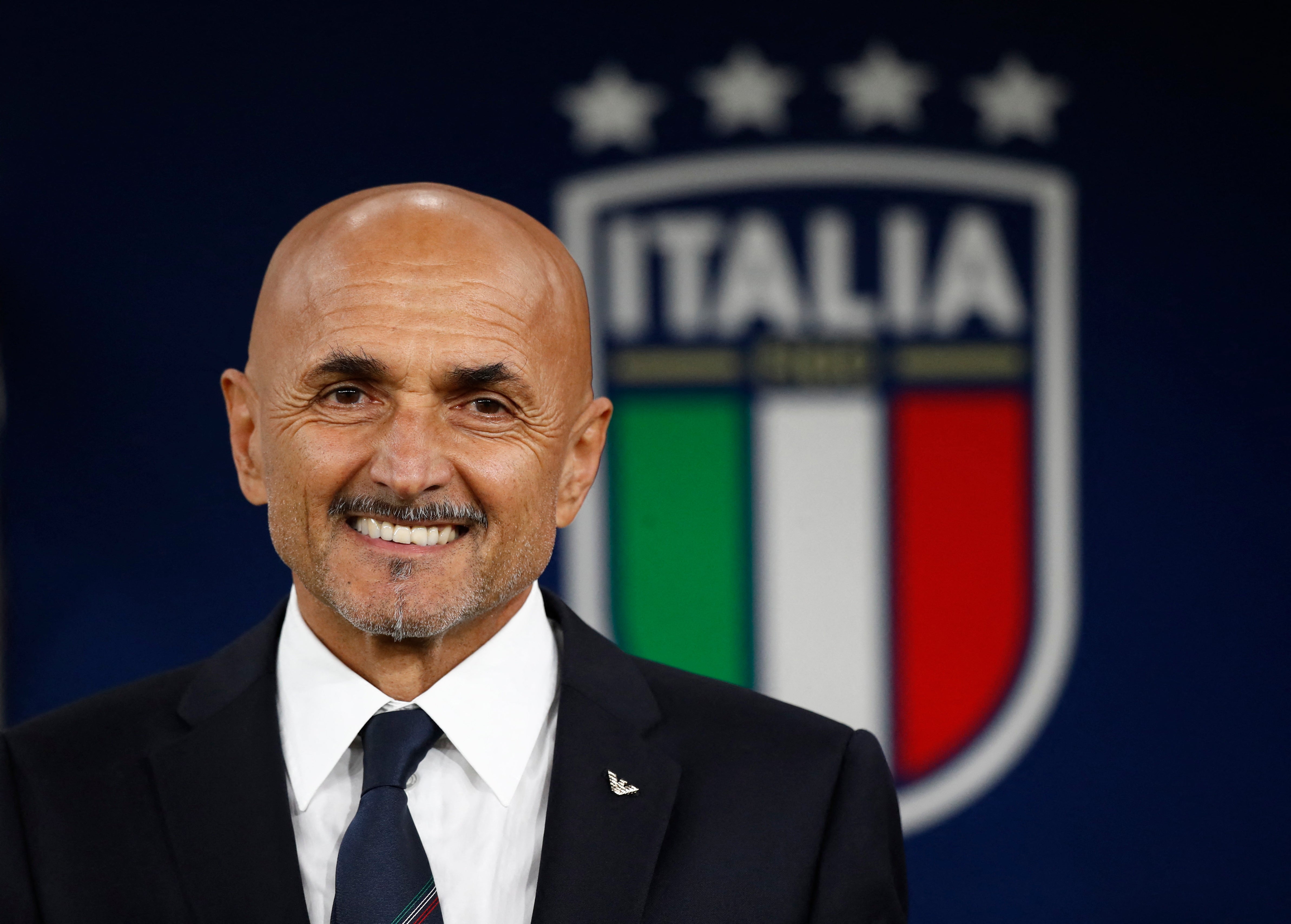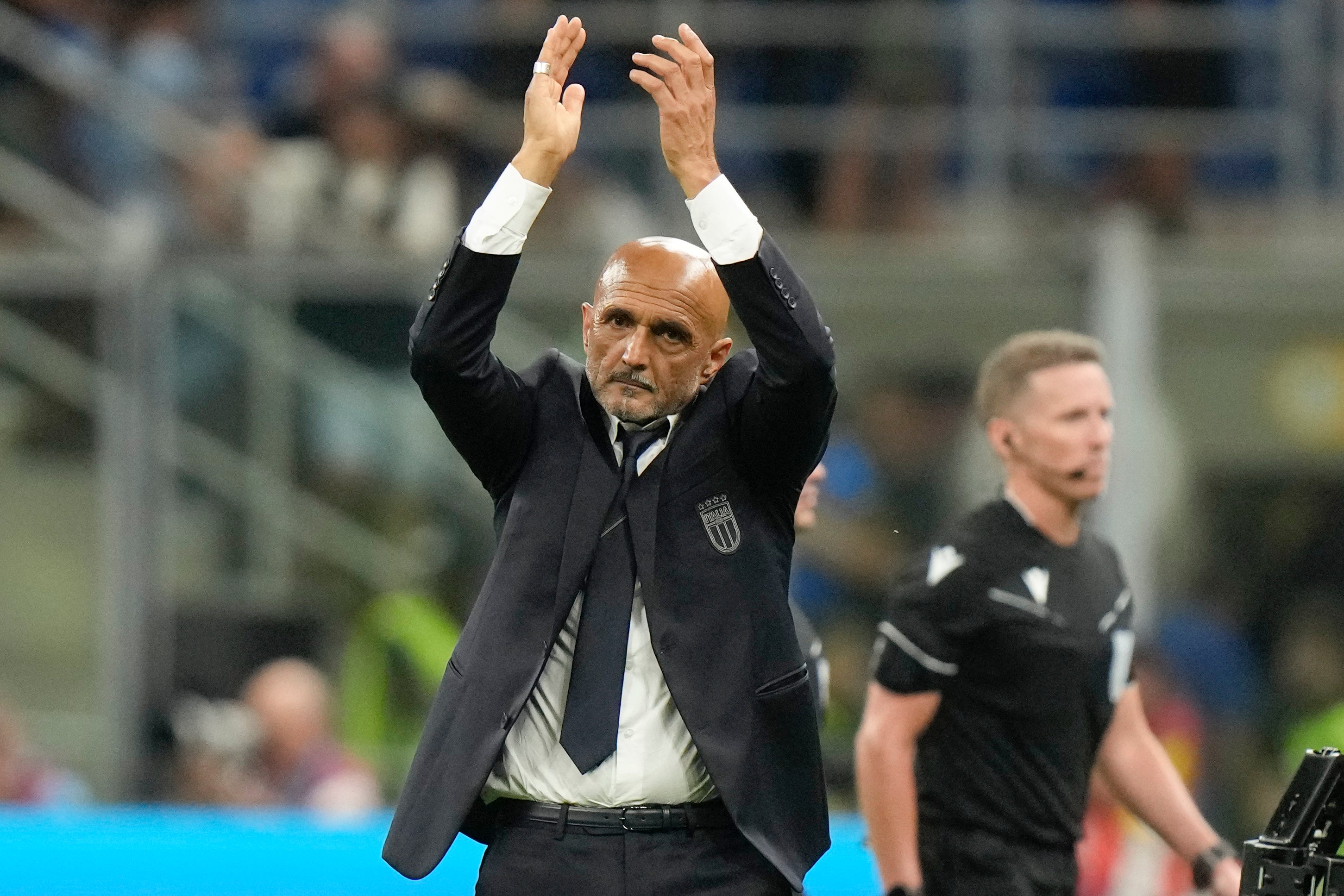Can Luciano Spalletti remake his Napoli recipe in charge of Italy?
Head coach led Napoli to a historic Serie A triumph last season but faces a whole new challenge resurrecting the Italian national team as they take on England at Wembley on Tuesday night

Your support helps us to tell the story
From reproductive rights to climate change to Big Tech, The Independent is on the ground when the story is developing. Whether it's investigating the financials of Elon Musk's pro-Trump PAC or producing our latest documentary, 'The A Word', which shines a light on the American women fighting for reproductive rights, we know how important it is to parse out the facts from the messaging.
At such a critical moment in US history, we need reporters on the ground. Your donation allows us to keep sending journalists to speak to both sides of the story.
The Independent is trusted by Americans across the entire political spectrum. And unlike many other quality news outlets, we choose not to lock Americans out of our reporting and analysis with paywalls. We believe quality journalism should be available to everyone, paid for by those who can afford it.
Your support makes all the difference.Luciano Spalletti was supposed to be on his Tuscan farm now. Arguably, though, he should still be at Napoli, managing what had looked like Europe’s most unexpectedly entertaining side. Instead, he will be at Wembley on Tuesday, in charge of Italy, his appointment a consequence of a combination of factors from the personal to the political, the footballing to the financial. Or, in a different way, of two emails.
One, triggering the extension in his Napoli contract without a pay rise, stemmed from club president Aurelio De Laurentiis, and instead prompted his resignation. A need for a sabbatical on his farm the cited reason; a breakdown in relationships more of a cause. The other, from Roberto Mancini’s camp a few months later, was his sudden resignation as Italy manager, the first to lead the Azzurri to a major title since Enzo Bearzot, trading the patriotism of leading his country for a reported £20m a year to take charge of Saudi Arabia instead.
And so it will be Spalletti in England, his presence a product of the enduring pulling power of the Azzurri job. While elite club coaches often eschew the international game, three of the last four incumbents, including Antonio Conte, are Scudetto winners, whereas no England manager has won the Premier League or the old Division 1 since Don Revie. It comes after the greatest feat of a career in the dugout that dates back three decades.
Spalletti became only the third manager to secure Napoli the Serie A title, and the first to do so without the benefit of Diego Maradona’s genius. The title was clinched in May: the footballing high came last autumn, amid a run of 13 consecutive wins in all competitions. There were 20 goals in the Champions League group stage: the 4-1 evisceration of Liverpool was, despite Manchester City’s spring demolitions of Bayern Munich and Real Madrid, arguably the finest performance in the competition all season. Rewind a year and Napoli were arguably the best side in world football at the time.
Which few predicted after the departures of Dries Mertens, Lorenzo Insigne and Kalidou Koulibaly. If there was magic in Spalletti’s attacking side, there was also the element of the unknown, in the revelation Khvicha Kvaratskhelia. What it was not, however, was a particularly Italian team: only three of the 14 players with the most appearances are even eligible for the Azzurri. Spalletti may name two of his former charges in his starting XI at Wembley, but while Giovanni Di Lorenzo captained Napoli, Giacomo Raspadori was only the understudy to the prolific Victor Osimhen.
If Spalletti’s alchemy is illustrated by Napoli’s struggles under his successor Rudi Garcia – beaten three times already at home this season, they have lost to each of the best sides they have faced – it may be required by Italy. His inheritance is mixed. “Once we have played [England], then I will tell you what the potential is,” Spalletti said after Saturday’s 4-0 win over Malta.

It is little more than a year since Italy were on a record run of 37 games unbeaten. It is only 28 months since the Azzurri won Euro 2020 at Wembley; in a rematch with England, perhaps only Gianluigi Donnarumma, Di Lorenzo and Nicolo Barella will start both games. Before England’s March win in Naples, Mancini lamented the Italian talent pool. “We are worse off than Southgate,” he said. It was a sign of the negativity enveloping him, an indication of the disenchantment that may have propelled him to the desert.
He gave 57 players their debuts, casting around with ingenuity and impatience. He looked to the Oriundi, seeking to naturalise some from the Italian diaspora. Spalletti has dropped the Argentina-born forward Mateo Retegui; he has also omitted some of the stalwarts of the recent past, in Leonardo Bonucci, Marco Verratti and Jorginho, while recalling Giacomo Bonaventura who, at 34, is older than his fellow midfielders.
He has five of Internazionale’s Champions League final starters and has given a debut to Tottenham’s in-form left-back Destiny Udogie. In other respects, however, it could be seen as an undistinguished squad, certainly compared to Italy’s past.
Lose and, if Ukraine beat Malta, Italy will find themselves three points behind their rivals for second spot, with a game in hand but a de facto decider when they face Ukraine in Leverkusen in November. It could mean Italy miss three of four major tournaments after Euro 2016; the added curiosity being that they won the other one.
In part, it reflects the tragedy of Mancini; unused as a hugely gifted forward in the 1990 World Cup, omitted in 1994 after falling out with Arrigo Sacchi, he had declared his ambition was to win the World Cup as Italy manager. Instead, they failed to qualify for the 2022 tournament; if he is at the 2026 version, it will be as the richly rewarded Saudi Arabia manager. There will be no Euro 2024 for him; there may be for Spalletti.
A wizened, gnomic figure is scarcely the stereotype of an Italian manager: more attack-minded, more idealistic, for years the architect of sides who were stylish nearly men. But then so, too, were an Azzurri side who influenced him in his upbringing. At his unveiling, Spalletti said he would carry the giant Italy flag his mother sewed for him as an 11-year-old to celebrate the 1970 World Cup semi-final win against West Germany. It was an epic 4-3. More than half a century later, Spalletti has no Gigi Riva, Gianni Rivera or Sandro Mazzola, nor an Osimhen or a Kvaratskhelia, no world-class forward. But, for the second time in two seasons, he has the chance to use his principles and his capacity to generate something spectacular from seemingly unpromising ingredients to make history.
Join our commenting forum
Join thought-provoking conversations, follow other Independent readers and see their replies
Comments